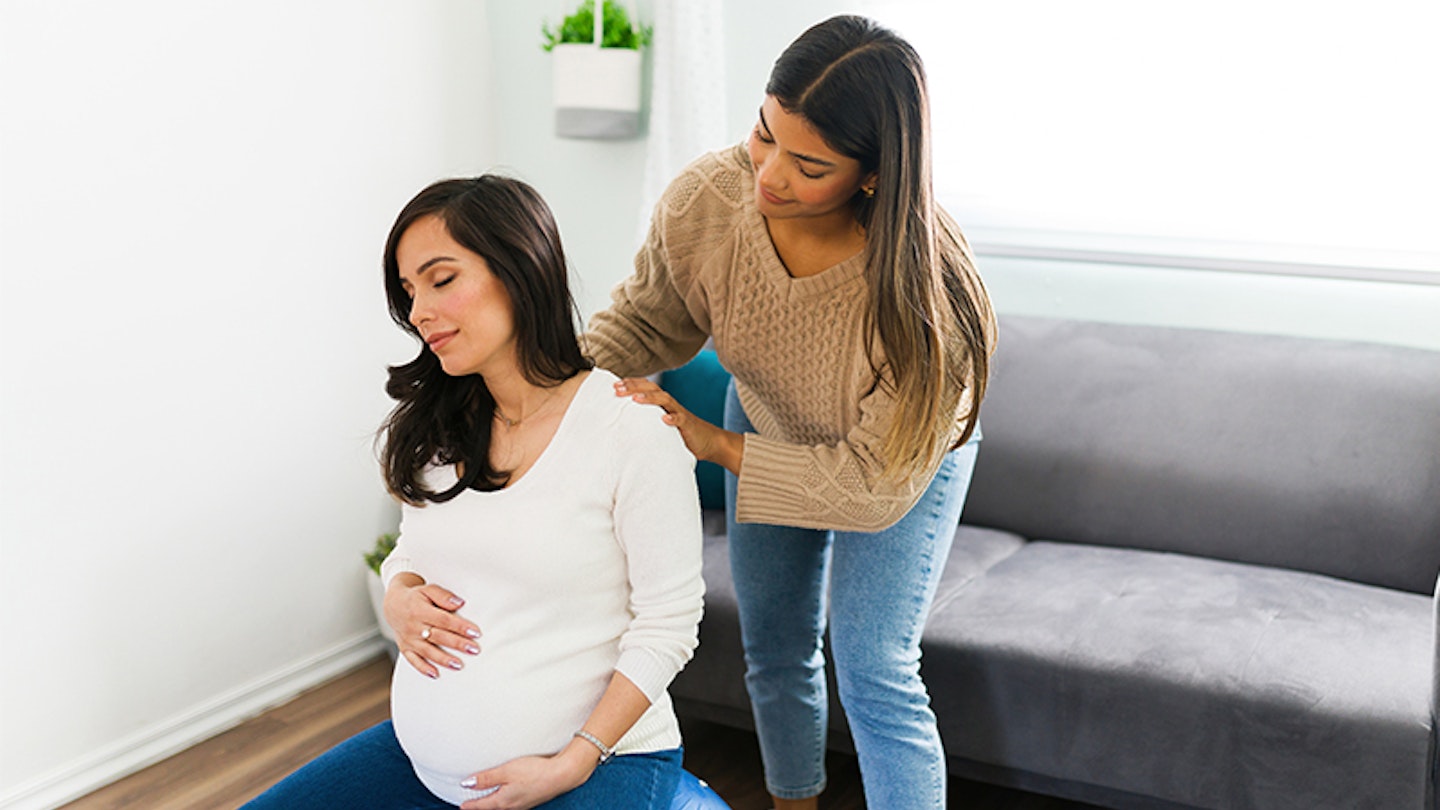Wherever you are in your baby journey, whether you’re trying to conceive, or are due any day, you might have heard about the benefits of having a birth doula. Actress Amy Schumer sang the praises of Domino Kirke, a birth doula who helped deliver Amy’s baby boy.
“I was lucky enough to get to have a doula,” says Amy in a previous Instagram post. “Her name is Domino Kirke at Carriage House Birth. What do doulas do? I don’t totally know, but what she did was make me and Chris feel totally secure and supported throughout my pregnancy and the birth process. I really recommend getting one if you can.”
So exactly what is a doula and should you get one? Here, we explain all.
What is a doula?
The word “doula” is a Greek word that means “female servant”. Back in ancient times, a maidservant would assist a pregnant woman in the delivery of the baby by getting her whatever she needed to be comfortable. She would provide back rubs, get water, wipe her forehead, and generally support her and be there for her emotionally.
But in today’s world, it's a little different. In the 60s, when the natural birthing movement started to gain popularity and women began looking into a more holistic, natural approach to labour and birth without medication and with low intervention, friends, relatives, and other female acquaintances would aid one another in this process, with great success.
"Doulas are women who provide social, emotional and practical support to pregnant, labouring and new mothers and their partners/families, and hope to inspire them with confidence and strength to navigate what can often be a challenging experience," says doulas Lou Toosey and Sarah Johnson from The Baby Experience.
"They have been professionally trained or have considerable relevant experience working with families in the perinatal and postpartum period."
What does a doula do?
"Above all, a doula is there to support the mother in whatever way she is required. She needs to be knowledgeable about birth and newborn babies, and offer the parents her unconditional non-judgemental regard in their unique decision-making processes, throughout pregnancy, birth and the early days with their newborn," explains Sarah.
Doulas may also have extra specialisms such as rebozo scarf work, acupressure or a breastfeeding qualification.
What is a birth doula?
Ok so now we know what a doula is - how does a birth doula differ?
"A birth doula normally meets with the mother early on in her pregnancy and gets to know her and her family. They have regular meetings and are in touch for the doula to answer questions and give advice as required. A birth doula will be on call to attend the labour and birth of the baby be it at home or hospital, vaginal or caesarean birth," says Lou. "She will help with massage, gentle encouragement and suggesting different comfort measures. Sometimes her role is described as “holding space” for the labouring mother. The birth doula is also likely to meet with the new family at least twice after their baby is born to offer help and support."
What a doula WILL do:
• Provide emotional support to help you through the process
• Provide physical support, often massaging and helping you stay comfortable
• Help your partner through the process also
• Get you whatever you need, be it water, music, pillows, etc.
• Listen to you and your wants/needs, and be your voice
What a doula WON’T do:
• Provide medical advice
• Provide professional medical assistance
• Get in the way of your doctor or midwife
• Make any decisions for you
What are the benefits of having a doula?
Continuous support during the labour and birth journey: The doula birth partner that you choose will be there for you from the beginning to the end of labour and delivery, and even earlier, if you so wish. Many doulas are available and on-call for you around the clock from about 37 weeksonwards. During labour, your doctor and midwife might be popping in and out of your room, possibly seeing to other patients at the same time. A birth doula will be there for you constantly, making you her number one priority for the entire duration of labour and delivery.
They'll make sure your birth plan is followed to a T: Your doula will take the time to listen to you and find out your wants, needs, and desires for your perfect birth. During labour and delivery, she will be your tough advocate and see to it that your needs, requirements, and personal preferences are met throughout the entire procedure.
You’ll have your own personal masseuse: Massage during labour is proven to ease pain and discomfort and your doula knows all the right points to rub to make you feel better. She’ll massage your back, and even your swollen feet.
They'll give you (and your partner) emotional support: Your doula can help you emotionally through this journey. It’s like having your own personal therapist and coach with you during one of the most emotionally drenching times of your life, giving you constant support, reassurance, encouragement and praise. They can also help your partner through the process and make sure that they are feeling strong and encouraged, and are appropriately supporting you, all while keeping you the main priority.
You'll get physical support: During labour you’ll need help getting up, sitting down, switching sides on the bed, getting to the loo, on the exercise ball, assistance in and out of the birth pool…Your doula will be your physical human crutch the entire time. She’ll give you water, ice chips and make sure you’re not too hot or cold. She’ll create a calm and soothing environment for you based on your personal preference, whether it’s having candles or music, or even dim lighting. She knows what you want and she’ll do her best to make sure you get it.
What is a postnatal doula?
A postnatal doula is normally employed to help the new mother after her baby is born in whatever way is required. "The role may be thought of as 'mothering the mother'. She is there to help mother and baby to bond and recover," says Sarah. "Her aim is for the mother to feel confident in feeding choices and baby care skills. A postnatal doula’s day may see her tidying up, keeping the laundry going and making warming, nourishing meals, as well as listening to parents and helping them to grow in confidence to manage and enjoy their new situation."

Birth Doula vs Midwife
There is a common misconception that a birth doula is a replacement for a midwife or a birth doctor. This is in no way true. A doula birth partner isn’t a substitute for your medical birthing professional, but rather, a support system for the mother.
“Both a midwife and a doula are there to emotionally and physically respond to the labouring woman’s needs. However, crucially a doula is not medically qualified and should not provide any clinical care and has no responsibility for decision making. She is governed only by what the mother wants and needs and what is required to help her achieve this," explains Lou. "The midwife is responsible for the woman’s and baby's health and safety and needs to follow the best medical practice, up-to-date hospital protocol and policies."
Are doulas insured?
Doulas should have their own insurance that covers them for Public Liability & Professional Indemnity. A doula is also likely to offer clients a written contract.
How much does a doula cost?
"The price of a birth doula depends on your postcode, the level of services and experience of the doula, but the average range is between £500-2000," says Sarah.
"Similarly, the price of a postnatal doula also depends on your postcode, and they can charge between £10-35 an hour."
How do I find a doula?
Use a website that has checked and verified the qualifications of their doulas. Here are some helpful resources when looking for a birth doula in the UK:
• Doula UK
